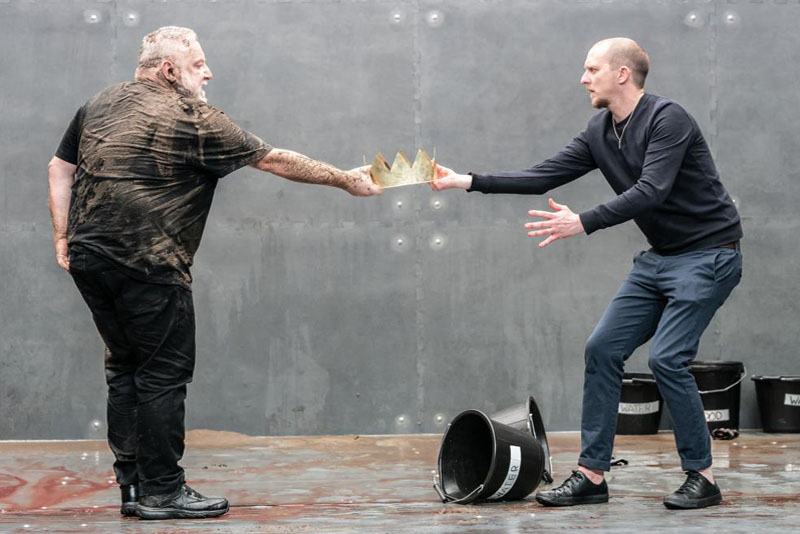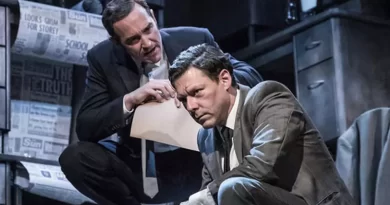“Richard II” at Almeida Theatre and Sam Wanamaker Playhouse
Neil Dowden sees two productions of Richard II at the Almeida Theatre and Sam Wanamaker Playhouse.
1 December 2018
This winter, London has seen the opening of two productions of Richard II that depart radically from traditional presentations of Shakespeare’s historical tragedy but are also very different from each other. At the Almeida Theatre, Shakespeare’s text is cut to the bone in a stripped-back, fast-spoken, contemporary production that focuses on the dynamics of power. And the production at the Sam Wanamaker Playhouse, featuring the first ever company of women of colour in a Shakespeare play on a major UK stage, holds up a mirror to a modern diverse Britain conflicted over its own identity.
Joe Hill-Gibbins’s Almeida production has reverted to Shakespeare’s full original title The Tragedy of King Richard the Second — which is ironic because this version is far from using the full original play text. Dramaturge Jeff James has cut out parts of the plot, some characters, and much dialogue so that, with no scene changes and the cast tearing through their lines, the show runs for just one hundred minutes without an interval. It concentrates on the opposing views of political authority at the heart of the play, but at the cost of sucking out much of its richness. More basically, if you haven’t seen the play before, or do not have a good grasp of English history, you may well struggle to follow what is going on.
The production starts near the end of the play (and indeed near the end of Richard’s life) with the recently deposed king’s exquisitely poignant soliloquy, beginning “I have been studying how I may compare / This prison where I live unto the world” and ending “With nothing shall be pleased till he be eased / With being nothing.” Then the show back-tracks to reveal how Richard came to lose his crown, his fatal mistake being to seize his cousin Bolingbroke’s inherited land after banishing him for six years, and so giving him (Bolingbroke) the pretext to lead an uprising against an already unpopular king. Fundamentally, it’s a leadership struggle between Richard’s entitlement and Bolingbroke’s pragmatism.

The ensemble. Richard II at the Almeida Theatre.
Photo credit: Marc Brenner.
Conditioned to believe his powers are God-given (the “divine right of kings”), Richard is usually presented with much pomp and circumstance. But here ceremony and ritual are supplanted by raw power games and anarchic squabbling. The staging resembles more a children’s playground than a royal court. If you are looking for contemporary resonances, the divisions within the nation and the conflict over legitimate mandate may suggest some contemporary parallels with Brexit — especially with John of Gaunt’s sad indictment that England “hath made a shameful conquest of itself”.
There is no sense of the historical significance of a spiritual outlook giving way to secularism in a show that eschews social context in favour of bare essentials. It also downplays the poetry of what is one of Shakespeare’s most lyrical plays, while Richard’s self-inflicted downfall does not reach tragic proportions as it is portrayed with more irony than poignancy. Hill-Gibbins’s minimalist production uses stylized choreography with the cast often huddled together or backed against the walls of designer Ultz’s grey riveted steel box as if trapped in a prison cell. Labelled hanging buckets contain blood-like red paint, soil, or water which are chucked over the set and cast with free abandon. The opening tournament scene lacks suspense, while the scene where nobles challenge each other by throwing down gauntlets is funny in its absurd notion of honour but here it is played so over the top that it becomes an irritating affectation. The small cast of eight wear modern casual clothes that are not differentiated between characters, adding to the confusion.

Simon Russell Beale and Leo Bill in Richard II at the Almeida Theatre.
Photo credit: Marc Brenner.
Simon Russell Beale is one of Britain’s foremost Shakespearean actors (having played most of the leading roles in the canon), but at fifty-eight he is unusually old to play the title role, and he sometimes seems more Lear than Richard. He inserts wry, sardonic humour into Richard’s speech as well as pathos at his predicament, but he does not get the chance to express the character’s full emotional journey. When he reluctantly hands over his crown to Bolingbroke in Flint Castle he appears more self-assured than his usurping cousin wracked by nervous guilt. But this role reversal goes against the grain of the play. Far from being a ruthlessly ambitious populist who seizes his opportunity with both hands, Leo Bill’s febrile Bolingbroke — who is unable to control the feuding nobles at Westminster — does not seem to have the leadership qualities required for the job of Henry IV. The other actors, who all play multiple roles, struggle to develop individual characters. However, Joseph Mydell conveys John of Gaunt’s fears for the future of his country; and Saskia Reeves skilfully moves from playing Bolingbroke’s enemy Mowbray, and Richard’s favourites Bushy and Green, to the Duchess of York wrangling with her husband by begging the new king to pardon their treasonable son — one of the play’s few comic moments.
Ironically, in the all-female Richard ll at the Sam Wanamaker Playhouse, the Duchess of York (one of just three female characters in the play) has been omitted, in a production that streamlines the text rather than guts it. Co-directed by Adjoa Andoh and Lynette Linton, with Andoh (who is only two years younger than Beale) also playing the lead, it is not just the whole cast who comprise women of colour, but those contributing to the production backstage too. This is more than a politically correct statement: the show gives a voice and a presence to those so often disenfranchised in the past in a post-colonial reflection on what it means to be British.
It’s particularly pertinent now in the wake of the seventieth anniversary of the Empire Windrush first bringing West Indian immigrants to Britain, and as we approach the date when Britain is due to leave the European Union. With a divided nation, weak government, and fears about the future, the modern parallels with Richard ll are made more explicit than in the Almeida production. Here it has been turned into a state-of-the-nation play about the identity of “this sceptred isle”.
Hanging above the sides of the stage in the traditional, candlelit Sam Wanamaker Playhouse are images of female antecedents of the cast, a powerful reminder of how those who were once subjects of the British Empire now contribute to this island’s multicultural society. Rajha Shakiry’s design also features a bamboo back wall, down which a huge St George’s Cross unfurls at the end of the show. The contemporary multi-ethnic costumes again emphasize Britain’s rich heritage, while Dominique Le Gendre’s hybrid of African and Asian-style music is played live by a small band in the gallery including use of a harmonium-like Indian shruti box.

Leila Farzad in Richard II at the Sam Wanamaker Playhouse.
Photo credit: Ingrid Pollard.
Andoh looks resplendent in an all-white trouser suit, wearing a golden headdress as crown, and carrying a fly-whisk reminiscent of certain African dictators. Her body language is imperious, manspreading as she oversees the dispute between Bolingbroke and Mowbray, abruptly stopping them as they begin to fight with sticks before punishing them differently — her king is arrogant, divisive, wayward, and impulsive. Courtiers may prostrate themselves, Eastern-style, but this shows reverence for the crown not the king himself. And when Richard is forced to abdicate, Andoh, now wearing an undershirt and leggings, reveals the complete emotional collapse of someone whose identity — so closely allied to his royal role — has been shattered like his image in the broken mirror.
Richard’s nemesis Bolingbroke is played with disappointingly bland straightforwardness by Sarah Niles, who calmly steps in to clear up the mess left by his predecessor. Dona Croll makes an impressive Gaunt, world-weary and wheelchair-bound, giving gravitas to his patriotic concerns. Shobna Gulati is a northern-accented, sometimes amusingly worried Duke of York who reluctantly swaps sides when it becomes clear that the country needs a change in leadership direction.
Overall, the production is fairly low-key, lacking some visceral excitement in the confrontations on stage, while the story is lucidly told even if it could do with more forward momentum. The downfall of Richard is shown visually in his descent from the castle towers of the gallery to languishing below the dungeon trapdoor, but even though some candles are extinguished, his murder could have been staged with more tension. Nonetheless, this is a refreshingly new take on a much-staged play that clearly makes the case that Shakespeare is for everyone — and also implies that Britain should be equally inclusive.

Doña Croll and Sarah Niles in Richard II at the Sam Wanamaker Playhouse.
Photo credit: Ingrid Pollard.









